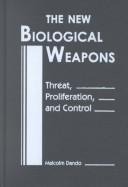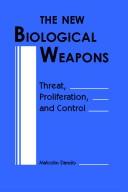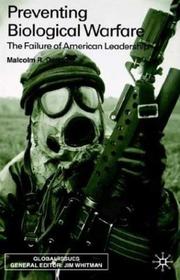| Listing 1 - 10 of 21 | << page >> |
Sort by
|

ISBN: 1555879241 Year: 2000 Publisher: Boulder, CO : Lynne Rienner Publishers,
Abstract | Keywords | Export | Availability | Bookmark
 Loading...
Loading...Choose an application
- Reference Manager
- EndNote
- RefWorks (Direct export to RefWorks)
Biological weapons --- Biological arms control --- Armes biologiques --- Contrôle --- Biological arms control. --- Biological weapons. --- Polemology

ISBN: 1588261786 9781588261786 1555879241 9781555879242 Year: 2022 Publisher: Boulder
Abstract | Keywords | Export | Availability | Bookmark
 Loading...
Loading...Choose an application
- Reference Manager
- EndNote
- RefWorks (Direct export to RefWorks)
Current revolutions in biotechnology and neuroscience are changing military technologies, necessitating dramatic reevaluations in arms regulatory regimes. This book assesses how these new technologies can be used in weapons systems—by governments and terrorists alike—and whether this frightening development can be brought under effective international control. Dando begins by surveying the existing (and arguably inadequate) control mechanisms for chemical and biological weapons. He then discusses how earlier generations of toxin and bioregulatory weapons have been developed by such states as Iraq, the former Soviet Union, and the U.S. and explains, in nontechnical terms, the scientific advances that have implications for new weapons technology. Considering how international law might be applied to constrain undesirable military developments without restricting technological developments for peaceful purposes, Dando concludes with a proposal for an integrated control regime that would link international agreements, national legislation, and trade regulations.
Biological weapons. --- Biological arms control. --- Biological weapons control --- Arms control --- Bacteriological weapons --- Biological warfare agents --- Bioweapons --- Weapons of mass destruction --- Biosecurity
Book
ISBN: 3031191072 3031191080 Year: 2023 Publisher: Cham Springer International Publishing AG
Abstract | Keywords | Export | Availability | Bookmark
 Loading...
Loading...Choose an application
- Reference Manager
- EndNote
- RefWorks (Direct export to RefWorks)
Book
ISBN: 1857530640 Year: 1994 Publisher: London Brassey's (UK)
Abstract | Keywords | Export | Availability | Bookmark
 Loading...
Loading...Choose an application
- Reference Manager
- EndNote
- RefWorks (Direct export to RefWorks)
Multi
ISBN: 9783031191084 9783031191077 9783031191091 Year: 2023 Publisher: Cham Springer International Publishing, Imprint: Palgrave Macmillan
Abstract | Keywords | Export | Availability | Bookmark
 Loading...
Loading...Choose an application
- Reference Manager
- EndNote
- RefWorks (Direct export to RefWorks)
This book offers an analysis of how the Chemical and Biological Weapons (CBW) regime has responded in the immediate aftermath of the Covid-19 pandemic. Coronavirus has highlighted the need to better protect modern societies from natural, accidental and deliberate disease affecting humans, animals and plants. Within that context preventing the deliberate hostile use of biological and chemical agents will be of increasing importance. Dando asks to what extent there has been a significant strengthening to the CBW non-proliferation regime in the immediate aftermath of the COVID-19 pandemic using an analysis focused on two proposals to strengthen the Chemical Weapons Convention and the Biological and Toxin Weapons Convention which aim to constrain advances in science and technology developments that could be misused. On this basis he concludes that it would be hard to argue that to date there has been a significant strengthening of the CBW regime. Malcolm Dando is Leverhulme Emeritus Fellow, Division of Peace Studies and International Development, School of Social Studies, University of Bradford, UK.
Politics --- Criminology. Victimology --- Law --- Polemology --- Biology --- Military engineering --- veiligheid (mensen) --- biologie --- politiek --- defensie --- Biological arms control. --- Chemical arms control. --- International Relations --- Political Science
Book
ISBN: 3030537900 3030537897 Year: 2020 Publisher: Cham : Springer International Publishing : Imprint: Springer,
Abstract | Keywords | Export | Availability | Bookmark
 Loading...
Loading...Choose an application
- Reference Manager
- EndNote
- RefWorks (Direct export to RefWorks)
After COVID-19 ensuring biological security will be a critical necessity. Neuroscience and the Problem of Dual Use focuses on the fact that benignly intended research in the life sciences could be misused for hostile purposes. It details the revolution that is taking place in neuroscience during this period of instability in international security, describes the new major State-funded brain research projects, and suggests ways in which hostile misuse could be prevented in coming decades.
Neurosciences. --- Bioethics. --- Neurobiology. --- Security, International. --- System safety. --- International Security Studies. --- Security Science and Technology. --- Safety, System --- Safety of systems --- Systems safety --- Accidents --- Industrial safety --- Systems engineering --- Collective security --- International security --- International relations --- Disarmament --- International organization --- Peace --- Neurosciences --- Biology --- Biomedical ethics --- Life sciences --- Life sciences ethics --- Science --- Neural sciences --- Neurological sciences --- Neuroscience --- Medical sciences --- Nervous system --- Prevention --- Moral and ethical aspects --- Moral and ethical aspects. --- Neurociències --- Seguretat internacional --- Seguretat col·lectiva --- Relacions internacionals --- Control d'armament --- Neutralitat --- Policia internacional --- Seguretat espacial --- Desarmament --- Pau --- Neurociència --- Ciències neurològiques --- Ciències de la salut --- Neuroanatomia --- Neurobiologia --- Neurociència computacional --- Neuroendocrinologia --- Neurofarmacologia --- Neurogenètica --- Neuroquímica --- Sistema nerviós

ISBN: 0333793099 Year: 2002 Publisher: Basingstoke : Palgrave,
Abstract | Keywords | Export | Availability | Bookmark
 Loading...
Loading...Choose an application
- Reference Manager
- EndNote
- RefWorks (Direct export to RefWorks)
Digital
ISBN: 9783030537906 Year: 2020 Publisher: Cham Springer International Publishing
Abstract | Keywords | Export | Availability | Bookmark
 Loading...
Loading...Choose an application
- Reference Manager
- EndNote
- RefWorks (Direct export to RefWorks)
After COVID-19 ensuring biological security will be a critical necessity. Neuroscience and the Problem of Dual Use focuses on the fact that benignly intended research in the life sciences could be misused for hostile purposes. It details the revolution that is taking place in neuroscience during this period of instability in international security, describes the new major State-funded brain research projects, and suggests ways in which hostile misuse could be prevented in coming decades.
Professional ethics. Deontology --- Law --- Physiology of nerves and sense organs --- Neuropathology --- Applied physical engineering --- neurologie --- veiligheid (mensen) --- bio-ethiek --- medische ethiek --- ingenieurswetenschappen --- neurobiologie
Book
ISBN: 3031101642 3031101634 Year: 2022 Publisher: Cham, Switzerland : Palgrave Macmillan,
Abstract | Keywords | Export | Availability | Bookmark
 Loading...
Loading...Choose an application
- Reference Manager
- EndNote
- RefWorks (Direct export to RefWorks)
Biological arms control. --- Biological weapons. --- Toxins. --- Natural toxicants --- Toxicants, Natural --- Toxins and antitoxins --- Antigens --- Metabolites --- Poisons --- Antitoxins --- Detoxification (Health) --- Bacteriological weapons --- Biological warfare agents --- Bioweapons --- Weapons of mass destruction --- Biosecurity --- Biological weapons control --- Arms control
Digital
ISBN: 9783031101649 9783031101632 9783031101656 9783031101663 Year: 2022 Publisher: Cham Springer International Publishing, Imprint: Palgrave Macmillan
Abstract | Keywords | Export | Availability | Bookmark
 Loading...
Loading...Choose an application
- Reference Manager
- EndNote
- RefWorks (Direct export to RefWorks)
'Unrivalled collection of concrete examples from across the globe of research where potential for weaponisation and opportunities for repression are high, but intent is unclear or could easily be misperceived. A substantial contribution to the current international debate on how we can raise political and legal barriers to prevent States misusing life science advances.' -Filippa Lentzos, Senior Lecturer in Science and International Security, King's College London, UK 'Asks the key question of how states and scientists should respond to the current advances in life science research and development to prevent their weaponisation. A must-read for all concerned.' -Nariyoshi Shinomiya, President National Defense Medical College of Japan 'Sheds light on the dangerously neglected threats from toxin and bioregulator weapons, and gives stark warning that current failure to regulate rapidly advancing sciences could allow development of new forms of such weapons capable of attacking diverse human life processes.' -Paul F. Walker, Vice Chair, Arms Control Association, and International Coordinator, CWC Coalition, USA This book explores how revolutionary developments and convergence of the chemical, life and associated sciences are impacting contemporary toxin and bioregulator research, and examines the risks of such research being misused for malign purposes. Investigating illustrative cases of dual use research of potential concern in China, India, Iran, Russia, Syria and the USA, the authors discuss how states can ensure such research and related activities are not utilised in weapons development. Although toxins and bioregulators are, in theory, covered by both the Biological and Toxin Weapons Convention and Chemical Weapons Convention, this apparent overlap in reality masks a dangerous regulatory gap - with neither Convention implemented effectively to address threats of weaponisation. This book highlights the potentially damaging consequences for international peace and security, and proposes realistic routes for action by states and the scientific community. Michael Crowley is Honorary Visiting Senior Research Fellow at Bradford University, and Research Associate with the Omega Research Foundation, UK. Malcolm R. Dando FRSB is Leverhulme Emeritus Fellow at Bradford University, UK.
International relations. Foreign policy --- Criminology. Victimology --- Law --- Polemology --- veiligheid (mensen) --- vrede --- internationale betrekkingen
| Listing 1 - 10 of 21 | << page >> |
Sort by
|

 Search
Search Feedback
Feedback About UniCat
About UniCat  Help
Help News
News